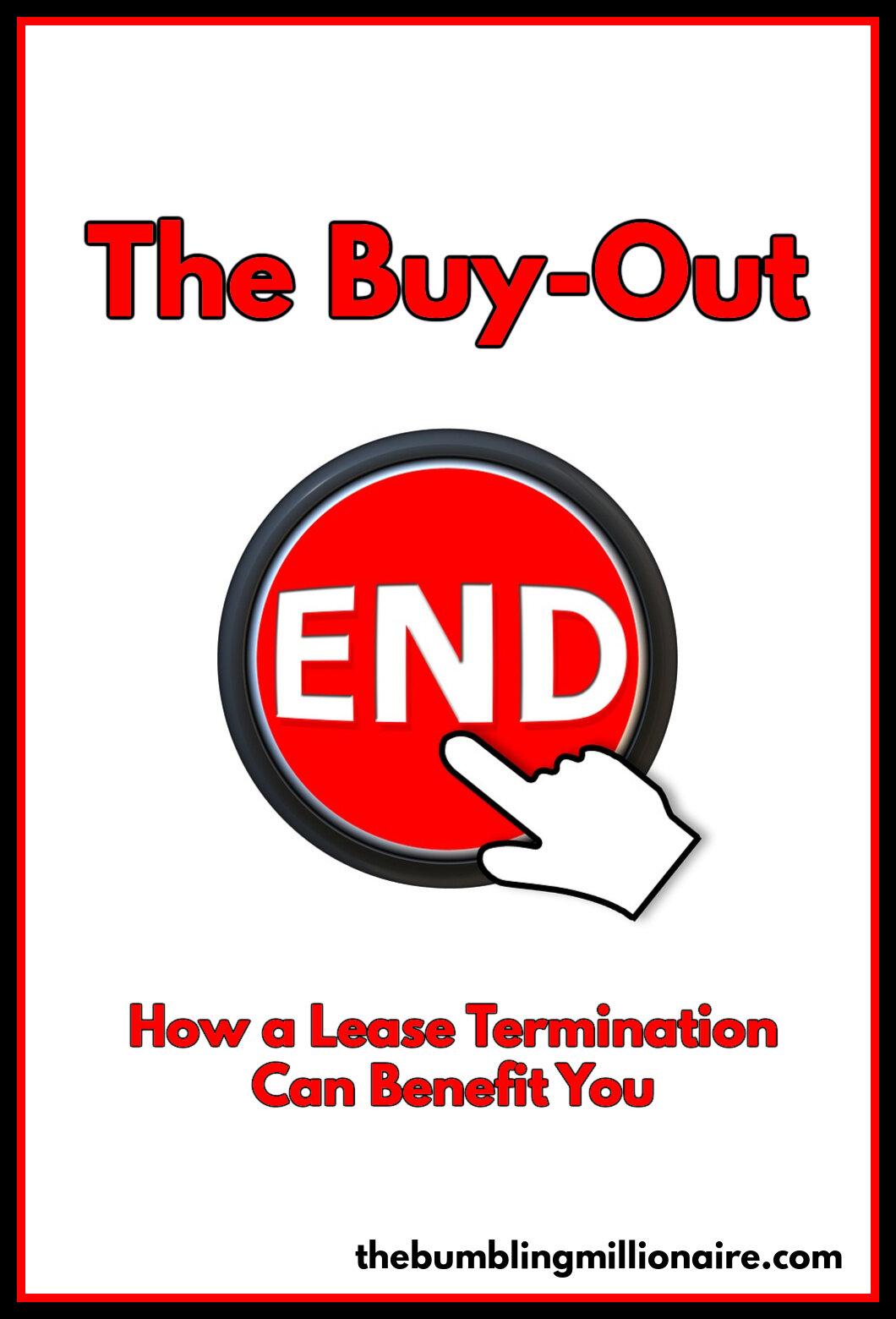The Buy-Out or How a Lease Termination Can Benefit You - Rosewood Retail, Part 2
/This is Part 2 of a 4 Part Series.
Because this is an active deal, with both existing tenants and partners, I can’t reveal certain deal terms. However, I will do my best to share what I've learned.
If you missed any of the other parts, please click below for the appropriate article...
This post may contain affiliate links. Learn more by reading my disclosure.
As time moves forward, things will change at any investment property. You are incredibly lucky if your tenants stay in place for a multitude of years and steadily pay rent. This reduces the associated costs and headaches of vacancies.
At our Rosewood Retail property, everything proceeded nicely for about two years. Then we were approached by one of the tenants who stated they wanted to terminate their lease early.
The medical billing service was ceasing operations. The doctor associated with the service was joining a larger organization and, therefore, needed to shut down his practice. However, they still had three years on their contract.
When you’re faced with this scenario, it’s an interesting proposition, but an exciting opportunity.
Do Unto Others
At a time like this, you may consider the biblical verse, “Do unto others as you would have them do unto you.” There are some who wouldn’t have this natural inclination. I do, but it must be tempered with business reasoning.
The building has been painted since part 1, but there is no tenant in the west end-cap.
I want to treat everyone the same way that I want to be treated. However, there’s still the business aspect that needs to be dealt with so I’m being a good steward of the property (and my partners’ investment).
A lease (contract) is done to mitigate risk on both sides. The term of the lease is set so that the tenant knows they can reasonably conduct business for an allotted time without losing the space to another entity, even a rival. For the landlord, the term of the lease is set so you don’t have a tenant unexpectantly leave a property.
When a tenant wants to break their lease, a landlord can do several things.
1. They can talk with them and work out a resolution;
2. They can avoid them and turn it over to an attorney;
3. They can avoid them entirely and let the problem snowball.
The second and third options are going to cost money for sure. The first option, in my opinion, gives the landlord an opportunity to get some money and possibly get ahead.
It’s Risky
We’re talking about risk and who’s left holding it.
With a lease termination, the tenant will pay an amount to terminate the lease today (or on a certain date). That ends their risk immediately. It will cost the tenant some money but they know that all further exposure to the costs of the lease has been mitigated. The tenant also knows they have terminated all other costs associated with the business at that location: utilities, insurance, employee wages, etc. Both large companies and local businesses can see the value in a lease termination if their venture wasn’t successful in a certain location.
With the lease termination, a landlord is being paid to re-assume risk. The tenant has effectively transferred all duties of the lease back to the landlord.
That vacancy staring the landlord in the face is again their responsibility. However, there is a silver lining. An upside, if you will. Think of it as double rent.
For example:
Tenant A wants to terminate their lease which has three years remaining. Their monthly rent is $1,000 / month.
36 months x $1,000 = $36,000.
Anything they can pay less than $36,000 will be a financial win. Also, if they aren’t responsible for the space for the full thirty-six months, that’s another win. Besides rent, they won’t have to pay utilities, insurance, payroll, inventory – you get the point, right? It’s in their best interest to work hard to reach an agreement to terminate the lease and walk away.
The landlord believes she can lease the space in six to twelve months. It might cost her some tenant improvement allowance, but it would cost her that much at the end of the lease anyway when Tenant A moves out.
For argument’s sake, let’s say Tenant A offers to pay $12,000 to vacate today. That’s one full year of rent. That may sound like a lot, but it’s not. That’s 30 cents on the dollar and I’ve seen (and negotiated) lease terminations much higher than that.
The landlord can negotiate this back and forth a bit, but to not slow down the example, the landlord accepts the offer. She draws up a contract to terminate the lease upon delivery of $12,000. Both parties sign and Tenant A is free from the lease. They have mitigated their risk and they move on with their life.
The landlord now has $12,000 working for her. However, time is going to chew that money up quickly.
Imagine now, that Tenant B shows up in thirty days to negotiate a lease. By the way, the landlord was smart and immediately advertised the space when Tenant A started negotiations to terminate their lease.
The new lease with Tenant B is quickly executed and they take over the space. The landlord agreed to two months of free rent at the start of their lease to allow the new tenant to build-out . Therefore, Tenant B is set to pay rent 90 days following the day the previous lease was terminated. The landlord essentially lost three months of rent. As part of lease negotiations, the landlord also agreed to give Tenant B $5,000 in improvement allowance.
Here are the costs associated with finding Tenant B:
$1,000 - One month lost rent following Tenant A’s lease termination
$2,000 - Two months free rent to Tenant B
$5,000 - Tenant improvement allowance to Tenant B
$8,000 – Total costs following the lease termination
All in all, $8,000 of the $12,000 of lease termination money has been devoured. However, the landlord is still $4,000 to the good. By assuming the risk associated with the lease termination, she collected essentially $4,000 worth of double rent.
Plus, she has a new tenant in place which will take her out further into the future than Tenant A would have.
As a caveat, though, had a tenant not shown up for one year, the landlord would be upside down. This is the risk in a lease termination and why it should be considered carefully. A landlord must understand how long it will normally take to lease a property before agreeing to terminate a contract.
It’s about risk and who is going to be left holding it.
The above scenario is exactly what happened with us (except the numbers were different, of course).
After we finished the lease termination with the medical group, we were approached by a start-up concept. A young entrepreneur wanted to open a cigar store and thought our building would be a good fit for him. It was a small space and affordable. Plus, we were willing to kick in some tenant improvement money.
The entrepreneur signed his lease in late 2012 and opened in early 2013.
Cigar Train has been an excellent addition to the neighborhood and our project.
Lessons Learned
Don’t Be Afraid of Bad News
When folks hear bad news, they immediately cringe. While I understand that feeling when it pertains to friends and family, we need to take a step back when it involves investment real estate.
Last year, Macy’s announced they were closing their downtown Spokane location. Immediately, some people were running around with a Chicken Little complex. “The sky is falling. The sky is falling.” In their mind’s, Macy’s leaving downtown was going to have a rapid domino effect on the rest of the core. However, Macy’s was an old, tired store in a building that had long ago needed to be completely renovated.
Fast forward to today, the former Macy’s building is under renovation and has been for most of the year. It will be a mixed-use project and will stand out in the city. The Chicken Littles have changed their tune and are now excited about what’s coming.
The same can happen on your building. If a tenant says they are leaving, or needs to terminate a lease, take a deep breath and evaluate the situation. You might have been given a great opportunity. You may have a chance to re-tenant a space or upgrade your building. Who knows what you can do?
Are you ready to read the next chapter?






